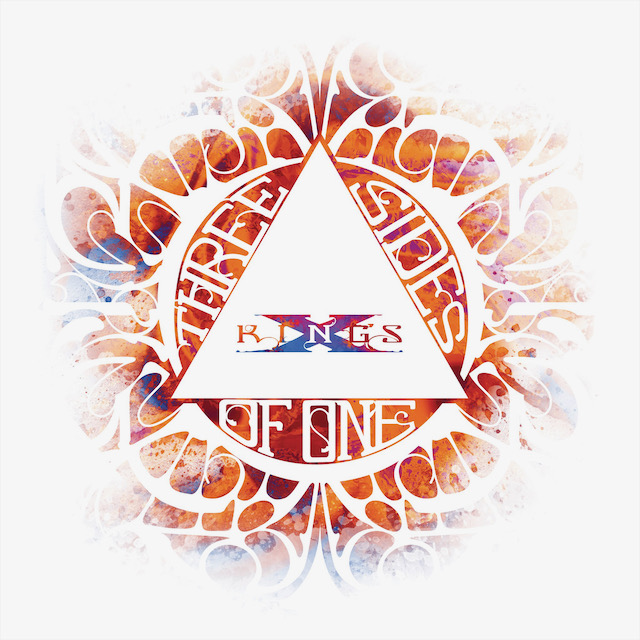KING’S X – “We Must Suck”
September 6, 2022, 2 years ago

It’s downright shocking to think it’s been 14 years since the last King’s X album. Dug Pinnick, Ty Tabor and Jerry Gaskill have always seemed to be around and in fact they have, playing live as King’s X but also each of them producing solo material and appearing as part of collaborations along the way. But indeed the XV album came out in May of 2008, back when Brave Words & Bloody Knuckles was a big fat print magazine—as Robert Plant said, “Does anybody remember paper?”
Just a warning: Three Sides of One is going to throw fans for a loop. To be sure, Please Come Home… Mr. Bulbous and Manic Moonlight were out on the fringes of the band’s identity, but this new one feels as white-knuckled as those, if not as dark. And there’s the beauty of the new album: there’s a sort of giddy creativity to it, a shedding of any sense of uniformity, swooping dynamics from soft to loud. I can’t help but be reminded of Glenn Tipton saying that Jugulator sounded as harsh and heavy as it did because of the missing steps in between that album reaching back to Painkiller. And even though that gap felt like forever, it was only seven years.
“I would say every song sounds different physically, mentally, emotionally and sonically,” begins Dug, just off the band’s first live dates in support of the record, but also after announcing that the entire European tour had been cancelled, due to Ty’s health, which Dug describes as an “immune deficiency.” “You’re gonna have to listen to the whole record to get the picture. And that’s just the way it is—we designed it that way; we did that on purpose. You know, think about the Beatles white album, right? Or Queen ‘Bohemian Rhapsody’ and the rest of that album. I mean, I play that record and I’m going, nothing relates on this record.”
And a bonus beauty to the wags and jags from one song to the next is what’s going on with the production. “Yes, with this, yeah, everything was different,” explains Pinnick. “But the main prerequisite was that everything had to be analog: no transistors, no digital, except for ProTools; the only thing that was digital was ProTools. And even when we mastered it, we mastered it with tubes. And then it was compressed by over-saturating the tape. So everything is analog, even the pedals. And mixing-wise, with Michael’s (Parnin) mix, we all agreed to mix every song as a single and not as something that’s coherent with the rest of the record. There’s different drum sounds on different songs, different bass tones. Like one Jerry song, ‘She Called Me Home,’ it sounds like a pop song that can be put on the radio. And then you have ‘Swipe Up,’ which is only for rock radio, heavy rock radio; I mean, even rock radio probably wouldn’t play it. We just covered all bases.”

Opposite of “She Called Me Home” is “Flood,” which contains some of the band’s heaviest music ever, something more akin to Poundhound or Dug solo at his most extreme. Then there’s “Swipe Up,” with its nod to… djent.
“Well, I’ve been a Meshuggah fanatic for the last ten years,” admits Dug. “Meshuggah is one of my favourite bands in the whole fucking world. And I think about the math and the different chords that they use. What I love about them is there is no other djent band… and we don’t call them djent anyway—that’s for all the wannabes. Those bands call themselves djent—Meshuggah is Meshuggah. What they did was they put a groove on everything they did. And when I met them, the guys in the band told me that Faith Hope Love was their favourite record by King’s X. They get the groove and we are comrades and that’s why I love them. The math is just inspirational. I always played mathematical because I love prog rock, and when I used to run and jog or when I used to walk around as a kid, on the ups and downs, I would always go ga-dung, ga-dung, as I’m walking—one, two, three, four. But I always I prided myself on seeing how syncopated I could get and how I could jump around the beat. I’ve done that in my mind all my life and I’ve often written like that. And when I heard Meshuggah, I went, oh my god, they have given me clarity as to what I’m hearing in my head. And so it just encouraged me to keep going with what I did. So I love that, man. I think we’ve both influenced each other in ways. I finally got to meet them about three years ago.”
Asked what stops the band releasing an album for 14 years, Pinnick says that, “We didn’t want to make another record until we were convinced that whatever we did was better than anything we ever did. Because if it’s not, we don’t want to do it. It’s very disheartening to keep putting records out and hear someone say that Gretchen was your best record. Or Faith Love Hope is your best record, or Dogman was your best record. It’s like, I don’t want to hear that. It’s like looking at your children going, well, that kid was cute, but that kid, you know, he got the bad genes. It’s an insult. I don’t need to hear it. That you think that’s the best thing we ever did. Yeah, you like it and you let me know you like it, but other than that, it’s kind of like, why would somebody want to do that?”
“And we honestly will admit to you that some records that we did weren’t our best efforts, but we gave those records our best effort. You know, on Manic Moonlight, we were in a dark hole. We didn’t know who we were, we didn’t know if we were going to stay together, we were depressed and we didn’t think anybody fucking cared. But we got together and made that record. And I wrote ‘Believe,’ which is one of my favourite songs by King’s X. And then, like, ‘False Alarm,’ I had fallen in love and that wasn’t a joke; that was honest. And ‘I will see you on the other side’ (‘The Other Side’), my brother told me that he had AIDS and was dying, you know. So that record was very deep in my heart, even though there were some songs on it that kind of made people feel like they were fillers. But we really worked hard.”
“Or when we did Please Come Home… Mr. Bulbous, I remember we got together at Ty’s house and here we are going, ‘Okay, we gotta make another record. Nobody seems to care anymore.’ We did Tapehead and blah, blah, blah. Ty said, ‘You know, we must suck. Why do we even do this? I don’t care about doing this no more.’ So he looked at me and said, ‘So what do you want to do?’ And I said, ‘Well, let’s take our drop-D guitars, drop them to A and write a fucked-up record and have some fun.’ And we wrote ‘Julia,’ which is the most dissonant song we’ve ever written. And Ty looked at me and said, ‘Can you sing over this?’ and I go ‘I can try.’ And we literally wrote a song the hardest way we could write it. And it gave us encouragement and so we made a whole record like that. Some people go, ‘I didn’t get that record,’ but other people go, ‘Man, that was one of my favourite records.’ In my opinion it was just us creating music from our heart, from who we were and where we were at.”

“So at this point,” continues Dug, “14 years goes by and the guys just didn’t feel that inspiration—and we lived far from each other (note: Dug is in LA, Ty is in Kansas City and Jerry is in New Jersey). Because remember, all the rest of the records we made, we all pretty much lived in the same town, so we could get together at each other’s house and hang out. But then after we all moved away, we didn’t see each other. So, ‘Wanna make a record?’ ‘Uh, uh, I don’t know.’ “
“Finally, when the time was right, you know, I talked to Derek Shulman, and he just says, ‘What do you want? People want to hear from King’s X. Come on, man. I’ll even go to bat for you and help you get the deal’ and all kinds of stuff. He says, ‘I’ll put my muscle behind it.’ And Derek Shulman started or scouted at Polygram and told me that he wanted to sign King’s X, but he wasn’t high enough on the totem pole at the time. And he’s been a long-time fan and friend, and also played and sang in Gentle Giant, which is one of my favourite bands from the ‘70s, a big inspiration to me. And he’s always popped up, you know, every few months, and we’d go out to eat. And he always asks, ‘What’s up with the band?’ and, ‘You know, I got some promotional ideas.’ And I go, ‘Yeah, but the guys, they just don’t care.’”
“So one day, the last thing he said to me was, ‘What would it take?’ And I go, ‘Well, we never got our just-do according to other people, which means we’re still living from month to month, paycheque-wise. That’s the only thing that… and I said, ‘Give us a bunch of money so we can put it in the bank and we can live the rest of our lives and we’ll make a record. And we’ll make the best record that we can think of. But it’s gotta be on our terms. You have no say-so in it; we will do what we want to. And don’t expect it to sell. And don’t tell us that you’re going to do everything you can and it’s going to work and you’re going to make it happen. Because it’s not.’ I mean, I gave him everything that was so negative about making a record. I just said, ‘We just don’t care anymore. I really don’t. We’re old and we’re just tired and we’re beat down.’”
“And so he got us a record deal that was lucrative enough for us to go into the studio and make a real record, like a real band with a big budget. And we spent the whole budget because that’s what it takes to make a real record. And we went home broke again, but we got a great fucking record like we did in the old days. And so that’s how that came about. I said, ‘Derek, send a proposal to the management and propose from the things that I’ve just told you.’ And he did and we worked a deal out. Then we went and made the record. And they’re still on board. And he’s starting to push some buttons to where a lot of people are gonna hear this music and we’re excited about it.”
In closing, I asked Dug if working on these other projects—most recently and prolifically Grinder Blues and KXM—has taught him any new lessons he brought to the construction of Three Sides of One.
“Um, the only lesson I got from the other projects was that I can make music with anybody,” laughs Dug. “But when I make music with King’s X, it’s magical. I’ve learned in all the other projects that I play with—and not taking away how great and amazing and incredible they are as musicians—the thing with King’s X is that the three of us play within each other’s nuance, not timing, not anything but nuance. We feel each other so deeply, that we play with each other in that manner. We’ve been lucky to meet each other and to be able to do that. We’ve honed in on it until it’s almost psychotic now.”
(Photo - Derek Soto)











